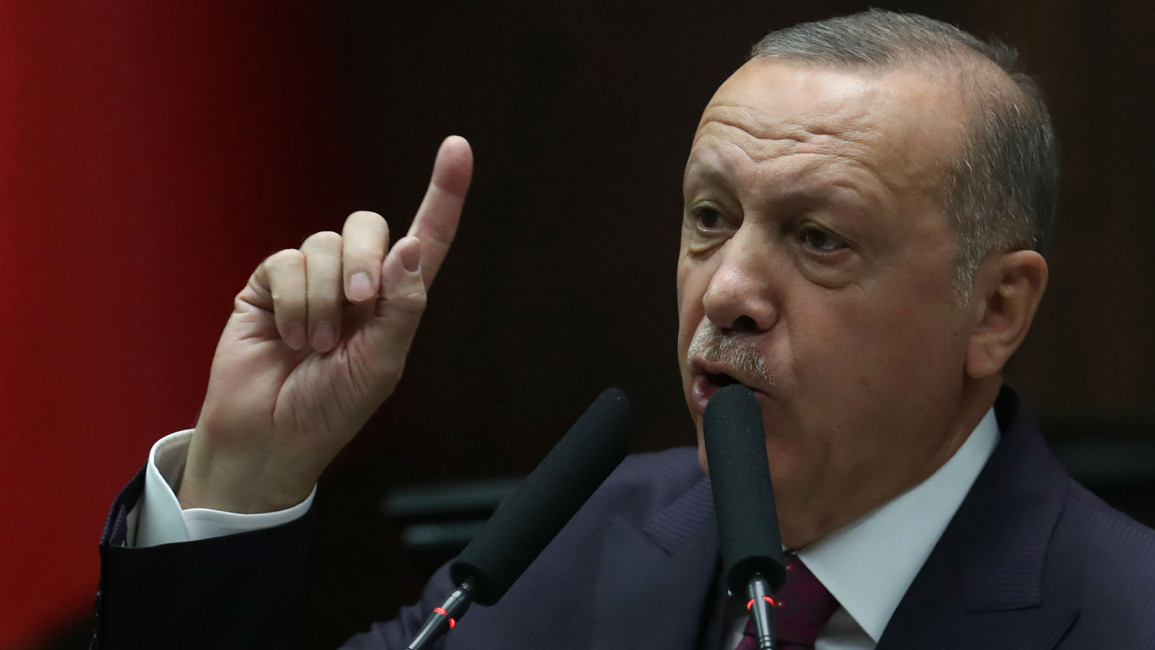Erdogan to rebuke Washington over Native American killings after US resolution on Armenia genocide
"We should oppose [the US] by reciprocating such decisions in parliament. And that is what we will do," said Erdogan to the pro-government A Haber news channel.
"Can we speak about America without mentioning [Native Americans]? It is a shameful moment in US history," he added.
The bill, which passed in the US Senate last week, had been stalled by President Donald Trump who was to meet the Turkish president at the time, but was eventually passed through.
While Turkey accepts that Armenians were killed at the hands of Ottoman forces during the First World War, they contest the gravity and scale of the killings.
Twitter Post
|
With the bill escalating political tensions between the two nations, Turkey's foreign minister, Mevlut Cavusoglu, said "politicians with limited knowledge about the history should not judge the history". He added that the move was a "political show" and not legally binding, but merely symbolic.
Seeking to diffuse the situation, president Trump's administration reiterated its position that it did not recognise the killings of Armenians as a genocide.
"The position of the administration has not changed" after the votes by Congress, State Department spokeswoman Morgan Ortagus said in a statement.
"Our views are reflected in the president's definitive statement on this issue from last April," she said.
In the statement on the mass killings' anniversary, Trump said the United States honoured victims of "one of the worst mass atrocities of the 20th century" but did not use the word genocide.
He instead encouraged Armenians and Turks to "acknowledge and reckon with their painful history".
Armenia says that 1.5 million were killed in an effort to wipe out the Christian ethnic group in the waning days of the Ottoman Empire, the forerunner of modern-day Turkey.
Twitter Post
|
Turkey puts the number far lower and adamantly rejects the term genocide, saying that Turks also died in what it considers fighting as part of First World War.
Earlier this week, the Turkish president revealed he could shut down two key US bases in the country following threats of sanctions after Senate resolutions were passed to recognise mass killings of Armenians as genocide.
Turkey could shut down its Incirlik air base, which hosts US nuclear warheads.
"If it is necessary for us to take such a step, of course we have the authority…If this is necessary, together with our delegations, we will close down Incirlik if necessary," president Tayyip Erdogan said on A Haber TV on Sunday.
The president added that he may also close the Kurecik radar base if necessary, adding: "If they are threating us with the implementation of these sanctions, of course we will be retaliating."
The Senate and House resolutions, both passed overwhelmingly, said it was the policy of the United States "to commemorate the Armenian genocide through official recognition and remembrance".
But the so-called simple resolutions, unlike laws passed by Congress, do not have the force of law or require the president's signature, meaning that the administration still has significant leeway in how to proceed.
Twitter Post
|
Senator Robert Menendez, the top Democrat on the Senate Foreign Relations Committee who spearheaded the resolution denounced Trump as being "on the wrong side of history".
"While not surprising, I am still deeply disappointed that both President Trump and Secretary Pompeo have yet to find their moral compass on this issue, and that they insist on allowing Turkey to have a veto on our own domestic decision," Menendez said.
"It's time for this nation to recognise the truth. We must honour those who lost their lives in the Armenian genocide, remember how they died and pledge ourselves to change the way history remembers their deaths," he said.
Allies of Trump had initially tried to block the resolutions in Congress in hopes of preserving relations with Turkish President Recep Tayyip Erdogan.
During a meeting in Washington last month, Trump said he was a "big fan" of Erdogan despite wide criticism in Congress over his human rights record and his incursion into Syria to fight Kurdish fighters formerly allied with Washington.
Trump has also held off on sanctions urged by Congress over the NATO ally's purchase of Russia's S-400 missile defence system.
Previous presidents have also struggled with how to address the events of 1915, with the Armenian-American community pushing hard for genocide recognition.
Barack Obama as a candidate promised to recognise the genocide but after his election did not use the word, instead saying that he stood by his pre-White House views.
Some 30 countries recognise the Armenian genocide, with several European nations criminalising denial.



